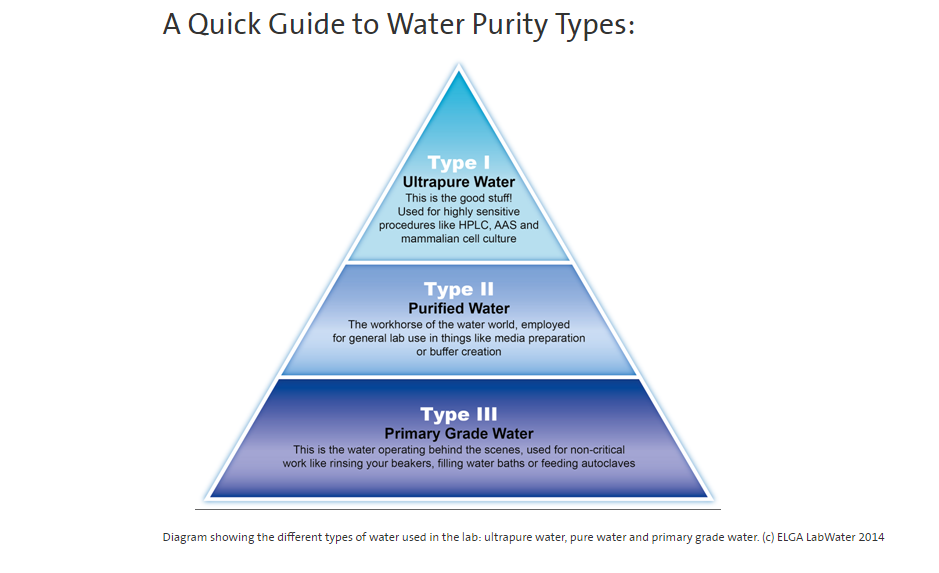Imagine spending weeks on a critical research project, only to discover your results are compromised due to water impurities. It's a scenario that's all too common, yet entirely preventable. Whether you're rinsing beakers with Type III water or conducting sensitive analytical procedures requiring Type I+ purity, your water purification system's reliability isn't just important - it's essential.
Water is used for a huge number of activities in a lab setting; from equipment washing to reagent and buffer preparation there are a variety of different water grades to suit individual applications. Depending on the intended use, there are also specific guidelines and regulations (eg. ISO 3696, ASTM D1193-06 or CLSI GP40-A4-AMD) covering the pH, conductivity, and levels of particulate and dissolved contaminants. The three main water types used in labs can be broadly divided into three types, as outlined in Figure 1.

Figure 1: A quick guide to water purity types. (© ELGA LabWater 2014)
Having the right grade of water for your needs is essential; using the wrong grade can affect both the reproducibility and reliability of results, as well as causing quality control and regulatory compliance issues. But even if you know the correct water type for your application, you still need water purifiers that are capable of delivering it to your laboratory, day in, day out.
A Deeper Analysis: Understanding Different Types of Pure Water for Laboratory Applications
Choosing the right technology
There are several things to think about to ensure a reliable supply of high-quality water. First and foremost is selecting the most appropriate purification technology or combination of technologies to meet your purity specifications and workflow demands. There is no one-size-fits-all solution. For example, distillation is both highly effective and very reliable, but similar results can be achieved at a lower cost using a combination of reverse osmosis (RO), continuous electrodeionisation (CEDI) and ultrafiltration (UF). Given the vast array of options available, it’s important to work with a knowledgeable and experienced supplier that can help you to choose the technology that meets the specific demands of your applications in the most cost-effective way.
Where is your water coming from?
The next consideration is where the water is coming from. The composition of the source water will affect both the efficiency of the purification process and the lifetime of equipment, and should be thoroughly analysed before you choose a purification solution. Depending on the quality of this source water, pre-treatment with water softeners or other chemical additives can help to cut operating costs and increase equipment lifespans. Again, a knowledgeable supplier can help you to choose the right solution for your needs.
Effective maintenance
Finally, effective maintenance is vital for any water purification system expected to operate at its best for prolonged periods. Preventative maintenance and equipment renewal schedules will vary according to the equipment type, source water, pre-treatment options and throughput of your lab, and should also be designed to provide a customer-specific balance between frequency of maintenance visits and the cost of unplanned downtime.
Making the Right Choice for Your Lab
Choosing the right water purification solution isn't just about meeting technical specifications - it's about understanding your laboratory's unique needs. Consider factors like:
- Daily water consumption patterns
- Required purity levels for different applications
- Available space and infrastructure
- Budget constraints and long-term operating costs
The Path Forward
Investing in the right water purification system is an investment in your laboratory's success. By partnering with experienced suppliers who understand both the technology and your specific needs, you can ensure a reliable supply of high-quality water that meets your exact requirements.
Want to learn more about optimising your laboratory's water supply? Contact our experts for a personalised consultation and discover how the right water purification solution can transform your laboratory operations by clicking here.